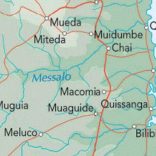Mozambique reports more than 10,000 patients with substance-abuse-related mental disorders in first ...
Renamo diverted attention from terrorism risks in Mozambique – researcher

File photo: AFP
African affairs expert Luca Bussotti said today that the Mozambican government has ignored the danger of terrorism in the country because it is focused on the “historical enemy” Renamo, stressing that the Islamic radicalisation has been taking place for several years.
“This movement has not just happened now, but probably Mozambican intelligence was more directed towards the historical enemy – the National Resistance of Mozambique [Renamo] – and did not realise that these radical groups were at work in Nampula and Cabo Delgado,” the academic director of the Technical University of Mozambique (UDM) told Lusa.
The wave of violence in the province of Cabo Delgado (two thousand kilometres north of Maputo in the far north of Mozambique, near Tanzania) gained media coverage following an armed attack on police stations in Mocimboa da Praia in October 2017, and since then dozens of attacks have been reported that killed about 100 people, according to official figures.
Bussotti says that the phenomenon “broke out a few years ago,” but the government (Frelimo-Mozambique Liberation Front) “disregarded the reports and did not take into account what was happening in Tanzania and Kenya,” where extremist Islamists were already active.
He also criticised the “absence of public policies” that left the population, especially in the north of the country, “in extreme poverty,” facilitating the turning of these “extremely vulnerable individuals” to groups “that guarantee minimum living conditions” where the state does not.
“They are small groups that work in remote villages where the presence of the state does not exist. They probably entered Mozambique thanks to foreigners from the Great Lakes, Tanzanians and Kenyans, and to Mozambicans who went to study in other countries and came back radicalised,” Bussotti maintains.
According to the expert, “Mozambican Islam is largely pacifist” and never supported these groups for various reasons, including economic reasons.
“I think the Islamic community will be interested in helping the government to identify individuals radicalising these groups in the mosques,” he said. “The main representatives are businessmen and one does not do business with blood and war.”
The researcher said that the Mozambican executive has made several mistakes in dealing with the attacks, especially at the communication level.
“The government has not given any information about the attacks. It’s all very secretive. One cannot find out who is behind the attacks and what their motivations are, because the government has decided to stifle everything and only after cases are reported does it give information.” “Citizens have a right to know” what is happening, he says.
Bussotti says the conventional army cannot deal effectively with these groups.
“We are dealing with guerrilla attacks, where battles do not happen out in the open. It’s intelligence work,” he says.
Another strategy is a closer approach and collaboration with neighbouring countries such as Tanzania, which have more experience in this type of problem.
Earlier this year, Tanzania’s Defence Minister Hussein Mwinyi met with his Mozambican counterpart, Atanásio Mtumuke, to discuss defence cooperation.












Leave a Reply
Be the First to Comment!
You must be logged in to post a comment.
You must be logged in to post a comment.